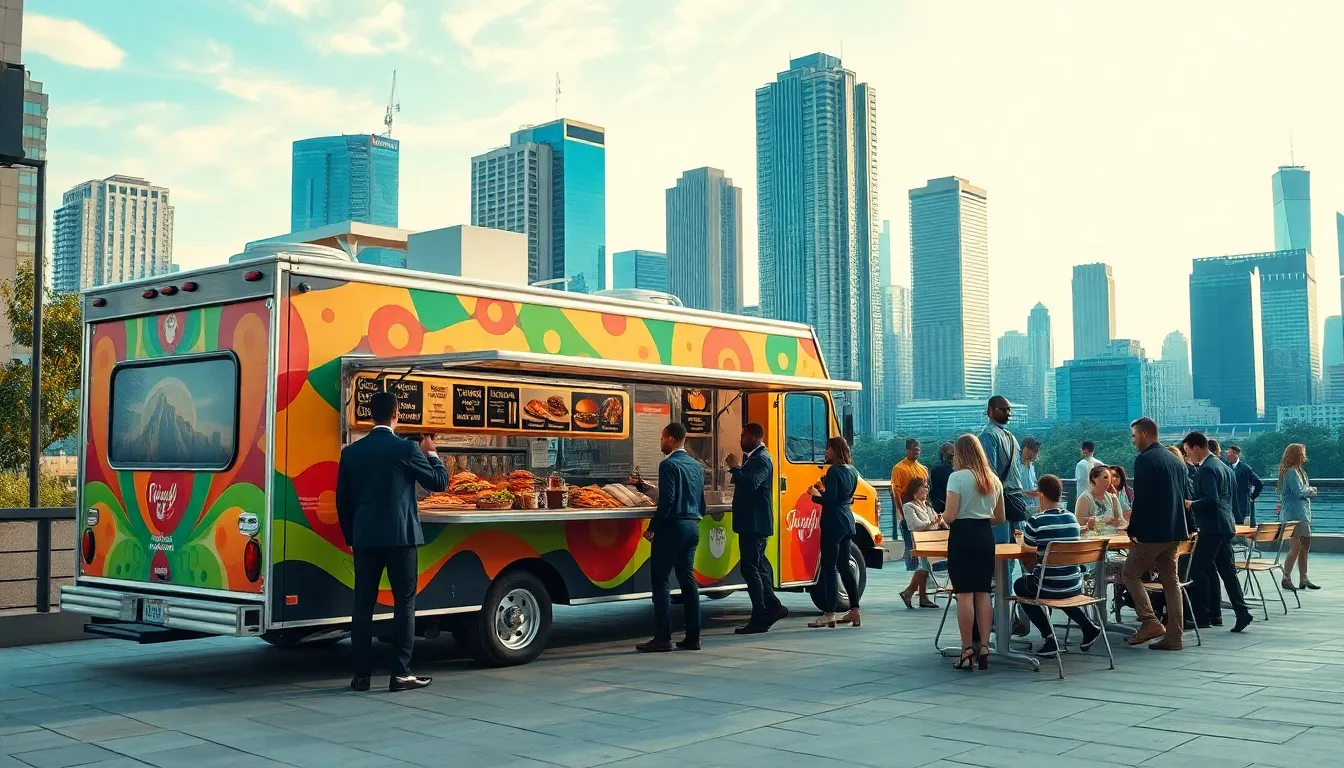Picture this: You’re strolling down a bustling city street, the aroma of sizzling burgers and spicy tacos wafting through the air. Suddenly, you’re hit with the vibrant colors of food trucks lined up like a delicious buffet on wheels. If food trucks were a trend, they’re the must-have accessory of modern cuisine. From gourmet grilled cheese to vegan delights, the adaptability of these mobile kitchens keeps pushing culinary boundaries. Ready to jump into the delicious world of food truck trends? Let’s hit the road.
Table of Contents
ToggleThe Evolution of Food Trucks

Food trucks have come a long way from their humble beginnings as street vendors selling hot dogs or tacos, often tucked in a dimly lit alley. Over the last decade, they have evolved into an essential part of the dining experience in urban environments across the United States and beyond. Originally dubbed ‘roach coaches,’ these mobile eateries were often looked down upon, but no longer. Today, they symbolize culinary artistry, showcasing flavors from around the globe. This transformation began in the early 2000s when ambitious chefs sought to break free from the constraints of traditional restaurants. With minimal startup costs and the freedom to experiment, they turned food trucks into platforms for creativity.
As the food truck culture blossomed, cities began to adapt, erecting regulations and infrastructure to accommodate these culinary pioneers. Soon, social media played a significant role in their rise, allowing patrons to track their favorite trucks and share mouth-watering photos. Food trucks have not only embraced change but driven it, becoming cachet hubs for food innovation and community involvement.
Culinary Creativity and Innovation
Culinary creativity is at the heart of what makes food trucks so appealing. Where else can you get a banh mi taco or a s’mores crepe? Chefs continuously push the envelope, marrying flavors and techniques that traditional sit-down restaurants sometimes shy away from. The food truck scene is essentially a playground for culinary experimentation.
By keeping their menus dynamic, switching flavors seasonally or introducing limited-time offerings, food trucks keep patrons coming back for more. Innovations have led to unique culinary fusions, such as Korean BBQ tacos or gourmet mac and cheese sandwiches. Various food truck operators even explore international cuisines with authenticity, presenting carefully curated recipes from their homeland. This creativity not only enhances the customer experience but also nurtures food culture in diverse communities.
Sustainability in Food Truck Operations
Sustainability isn’t just a buzzword: it’s an essential trend in food truck operations. Many food truck vendors are prioritizing eco-friendly practices as both consumers and their conscience push for more mindful consumption. Utilizing local ingredients? Check. Adopting sustainable packaging? Double check. Vendors are now focusing on minimizing waste while also offering delectable meals.
Some food trucks even go a step further by offsetting their carbon footprint. This includes everything from solar panels to composting food waste. The opportunity to serve fresh, organic food appeals to a growing demographic that values sustainability. Customers often feel good about supporting businesses that align with their environmental values, making it a win-win for both parties.
Technology Integration in Food Trucks
Welcome to the age where food meets tech. Food trucks have embraced technology in ways that transform the dining experience. From cashless transactions to mobile ordering apps, innovations streamline operations and enhance customer satisfaction.
GPS tracking allows customers to locate their favorite food trucks with ease, while social media platforms keep them engaged with real-time updates. Also, food trucks are increasingly equipping themselves with kitchen technology that improves efficiency, enabling faster service. Healthier cooking methods, such as air fryers, have become staples, marrying technology and health consciousness smoothly. The incorporation of tech helps vendors operate smarter, reduce costs, and deliver that mouth-watering meal faster.
Health-Conscious Options and Dietary Trends
As Americans become more health-conscious, food trucks adapt by offering numerous options to cater to dietary preferences. Vegan, gluten-free, and keto-friendly menus aren’t just trends: they’re here to stay. In response to demand, food truck owners are crafting delicious dishes that prioritize health without sacrificing taste.
Think avocado toast topped with protein-rich sunflower seeds or zoodles swimming in zesty sauces. Salad trucks have also popped up, showcasing innovative creations that make greens exciting again. This growing awareness empowers consumers, allowing them to indulge guilt-free, all while supporting local businesses.
The Impact of Social Media on Food Truck Success
Let’s face it: social media is a game-changer. Food trucks have leveraged platforms like Instagram and TikTok to showcase their unique offerings through drool-worthy visuals. Imagine scrolling through your feed and stumbling upon a vibrant image of a taco topped with edible flowers. You’d be curious, right? That’s exactly the kind of engagement food truck owners are banking on.
In fact, social media presence can directly influence a food truck’s success. A well-curated online persona garners attention, boosts sales, and often leads to loyal followings. Many food trucks use customer-generated content as marketing gold, showcasing patrons enjoying their meals. The hashtags and geotags not only serve to build community but also entice newcomers. In the fast-paced food truck world, keeping up with the social media trend isn’t just an add-on: it’s a necessity.
Future Directions for Food Trucks
The future of food trucks is brighter than a neon sign. As the industry continues evolving, several trends are likely to gain traction. Expect to see hybrid models, where food trucks partner with brick-and-mortar establishments for pop-up collaborations. These partnerships create a win-win situation, food trucks gain visibility, and established restaurants diversify their offerings.
Also, as food delivery apps increase in popularity, food trucks could create niches within this market, enabling them to reach homebound customers directly. Virtual kitchens, which operate without a physical space, are also likely to rise alongside food trucks adapting to urban culinary landscapes. From health trends to tech advancements, the future is shaping up to be full of flavorful possibilities.


